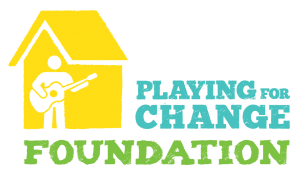Whether you are a classroom teacher or running an extracurricular group, we have a way for you to connect with a PFC Sister School! Through this program, your students learn about and help choose their sister school, create a PFC Sister School board to share their new discoveries, and then embark on a four step journey of global connection!
Step 1: Choose a musical, creative, or social justice project and complete it about your own school. This first step allows for your students to honor their own heritage and culture, and then to act as teachers to share their project with their sister school. During this time, your sister school creates their own project about their school.
Step 2: Sister Schools collaborate and share through Skype or private social media, with each school teaching about their own communities through their projects..
Step 3: Choose a different project, or create your own, but this time about your Sister School! This third step promotes cross-cultural and lifelong learning among the students, and they get to learn about their new friends! During this time, your sister school learns about and creates a project for your school!
Step 4: Sister Schools collaborate, with each school presenting what they have learned about each other.
We have created resources to guide your through this process, with shared project ideas as well as specific classroom projects that fulfill social studies content standards for classroom teachers. Let’s register and get started!






>“What similarities/differences can you find between the climate, vegetation, and native animals at your school and your PFCF Sister School?”
>For example, a student in West Virginia created a 3D map to learn about the physical geography of her sister school in Argentina.



Students at Morgantown Learning Academy in West Virginia chose to sing portions of United in Hungarian, Russian, Spanish, and English, for instance, to represent the languages in their class. They invited other students and teachers to play with them and recorded a video.



>Please take a look at the Program Tiers to review the capabilities of each of our schools before choosing your sister school.
SISTER SCHOOLS FOR CHANGE VIDEOS

We'd like to give a shout out to the kids at West Virginia PK-8 school Morgantown Learning Academy (MLA) whose dedication and kind hearts helped to inspire us to create our new Sister School Program.
OUR MUSIC PROGRAMS AROUND THE WORLD































heritage. The Griots play an essential role in Malian culture; they are the
keepers of oral history and traditions, passing them on through music
and poetry. Kirina has been preserving its unique musical and cultural
heritage for more than 700 years and the school helps the people of
Kirina preserve and share their cultural heritage and musical traditions.
The music school offers classes in kora, djembe, balafon, dance and tama.
We introduced language classes in French and English as well as an evening
class program where teachers from the public school are coming each week
to the music school to give extra lessons in English, French, and Sciences.


Ghana, hometown of Mohammed Alidu, who has played percussion with the
Playing For Change Band. Alidu is a descendant of a long line of talking drum
chiefs known as the "Bizung" that have lived in the area for more than 1,000 years.
In his family's honor, this place of inspiration has aptly been named the Bizung School
of Music and Dance. The school offers music and dance classes that are rooted in the
traditional style of Northern Ghana. Children have a safe and nurturing environment
in which to learn, as well as opportunities to share their cultural and musical traditions
with other children around the world.




The music and sports program provides music instruction in traditional dance, drumming as well as keyboards and guitar taught by two dynamic instructors. Star School is the first PFCF music program to include sports as a part of its curriculum with a thriving soccer program reaching an even greater number of youth.


The program is being led by six talented teachers, including former Ntonga teachers, John Ntshibilikwana and Nelson Mongezi, in addition to PFC Band members Mermans, Titi and Jason. Students are learning guitar, vocals, drums, saxophone and keyboard/piano as well as dance and marimba.




The organization sprouted from the vision of a handful of expatriate Bangladeshi in 1998, and it is dedicated to better the lives of the less advantaged people in Bangladesh. SpaandanB initiates and implements projects in the areas of education, health care, and promotion of sustained subsistence. Approximately 350 children aged 5 to 12 years old are being served by this program.














